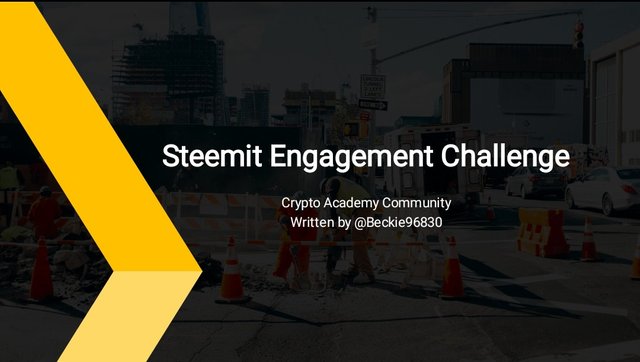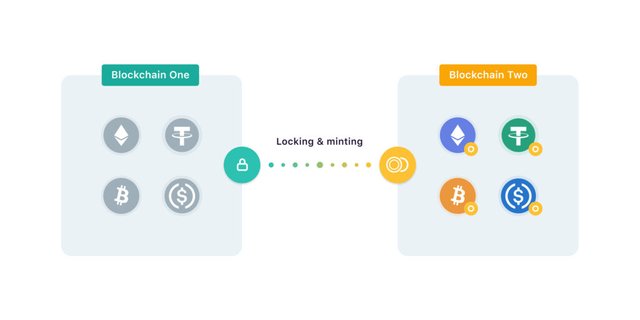
The crypto academy community wants participants to discuss and explain their understanding of Blockchain Bridges, I will be responding to the assignment given.
Question
What do you understand by a blockchain bridge? And what necessitated bridges in the blockchain.
Blockchain Bridge
Blockchain technology and decentralized finance were introduced to the world in 2009 by Satoshi Nakamoto with the creation of Bitcoin. Ever since this feat, Blockchain technology has proven to be efficient in many areas and across multiple sectors because of its data security capabilities. Over the years, the usage of Blockchain technology has grown widely in decentralized finance (DeFi), and this led to the creation of multiple Blockchains that use different protocol data.
As the adoption of Blockchain technology in different areas increase, the need for data communication between blockchain increases. This distinctive recurring problem in Blockchain surfaced, which is the lack of communication (data sharing) between Blockchains, as Blockchains are considered to be a closed system. Initially, Blockchain communicated with Blockchain oracles, which serve as a mediator (data translators) between two Blockchains or between real-world data and a Blockchain. But to encourage Interoperability between Blockchains, the Blockchain Bridge was created.
Blockchain Bridge is a link built between Blockchains that enable structured data communication between the associated Blockchains. Blockchain Bridge serves as a translation layer between the Blockchain which can operate using different algorithms, protocols, and governance structures. In plain text, bridges in Blockchain enable Interoperability between different Blockchains.
For instance, Ethereum Blockchain is known to have Ether (ETH) as its native token. A bridge can allow a transfer of ETH to Bitcoin Blockchain without having to sell the ETH to buy BTC.
There are primarily two types of bridges, they include Trusted Bridges (centralized) and Trustless Bridges (Decentralized). The Trusted bridge relies on a third party to run its operations, while the Trustless bridge use algorithms and smart contracts in executing its function.

Question
What are the benefits of the blockchain bridge? How does the bridge work?
Benefits of Blockchain Bridges
There are various benefits of blockchain bridges, some of which include the following:
1) Cross-Chain Communication
The primary benefit of blockchain bridges is their ability to facilitate interoperability and cross-chain data communication. This is very important as different Blockchains can now collaborate to create efficient products for on-chain subscribers, thus allowing Blockchains to play according to their core strength.
2) Cross-chain Token Transfer
Ideally, Blockchain only allows the use of its native token within the Blockchain, this can hinder growth as it cost more to swap between Blockchains, this can be remedied with Blockchain bridges since it allows for cross-chain token transfer without requiring the default token swap.
3) Improved Scalability
Blockchain bridges can improve the capacity of a Blockchain to accommodate more users. Bridges with high usage efficiency can balance the workload of a Blockchain without sacrificing the original network bandwidth in processing transactions. This can greatly improve the overall network experience of the Blockchain.
4) Cross-chain DApp Usage
Similar to tokens, DApps by default only operate on their host Blockchain. This can limit the utility value of the decentralized application. But with the use of Blockchain bridges, DApps can be used across multiple Blockchain when the specific use function arises.
How Blockchain Bridge Works
There are various steps involved in explaining how a Blockchain bridge works. I'll illustrate this using a token transfer process.
First, an equivalent of the token to be transferred is locked within the Blockchain, and a synthetic derivative is minted in the Blockchain. The minted derivative is presented as a "wrapped" token, which is in equal proportion to the locked token. The wrapped token is transferred to the other Blockchain.
For instance, Sending ETH to a Bitcoin wallet using a bridge will create a synthetic derivative of ETH which can be wETH which can be sent to the Bitcoin wallet.

The wrapped tokens can now be used in the Bitcoin Blockchain.

Question
Highlight the types of blockchain bridges by category. Pick an example of a blockchain bridge in existence and explain how it works
Blockchain Bridges By Category
As previously explained, there are two categories of Blockchain bridges, they include Trusted Bridges (Centralized) and Trustless Bridges (Decentralized). I'll explain better below:
1) Trusted Bridges (Centralized)
Trusted Bridges are Blockchain bridges that rely on a third party to operate. The bridge is typically owned and managed by a third party, this makes trust a basic requirement to use this bridge as the locked assets and liquidity is been kept based on trust.
2) Trustless Bridges (Decentralized)
Trustless Bridges are Blockchain bridges that utilize smart contracts and algorithms to operate and manage the execution of the bridge on a Blockchain. As the name implies this process is completely trustless and there is no third party mediating the transaction. The security of the locked assets relies on the security architecture of the Blockchain.
Example of Blockchain Bridge

Wormhole Bridge
An example of a Blockchain bridge is the "Wormhole Bridge". The wormhole bridge is a cross-chain bridge that allows the transfer of Tokens across supported Blockchains. The list of supported blockchains includes Solana, Ethereum, Terra, BNB chain, Polygon, Fantom, etc. Ideally, when a token transfer using a wormhole is initiated, the asset is locked and the wormhole token equivalent is minted. The wormhole-minted token can now be transferred it the target Blockchain. To reverse the transfer, the same procedure is used.

Question
Are there limitations to the blockchain bridges? What do you think about the future of blockchain bridges?
Limitations of Blockchain Bridges
There are some limitations of Blockchain bridges, some of which include the following:
1) Risk of Hack
Trustless bridges rely on smart contracts for execution, making them an easy target for experienced hackers who can exploit the code and other vulnerable spots in an attempt to steal the tokens bonded to the contract. This makes for big security concern.
2) Trust Issues
Using the trusted bridges requires the node to trust in the operations of the bridge owners to deliver the transacted amount in due time. This primarily defies the aim of decentralization. Thus using these bridges can come at a cost.
3) Transaction Delay
With the introduction of the bridge, evading high transaction costs can lead to a high level of network congestion. This result from node moving their tokens from one chain to another using bridge to avoid the standard network fees. This can cause a lot of transaction overhead.
Future of Blockchain Bridges
I think the idea of a Blockchain bridge is a very important concept in the growth of Blockchain and decentralized finance, as it improves on the deficiencies of blockchains. I think if the primary concerns of security are properly handled, it would be widely adopted making it one of the best innovations since the launch of Blockchain technology in 2009.

Conclusion
Blockchain technology has no doubt improved the day-to-day affairs of business activities, as its adoption across multiple business sectors ensures improved security and efficiency of the adopting system. With the adoption of Blockchain bridges, the effectiveness of Blockchain technology will only increase. As data security and interoperability of Blockchain are guaranteed through the use of Trusted and Trustless bridges.
Hello dear I most say that you are a perfect writer and I so much admire your pattern of writing. Indeed you have written well about blockchain bridge which I so much enjoy reading. Best of luck to you.
Downvoting a post can decrease pending rewards and make it less visible. Common reasons:
Submit
Thanks for stopping by.
Downvoting a post can decrease pending rewards and make it less visible. Common reasons:
Submit
I agree that Blockchain bridges can improve scalability, which is a very important phenomenon when it comes to blockchain. Nicely written.
Downvoting a post can decrease pending rewards and make it less visible. Common reasons:
Submit
Yeah, bridges in Blockchain can go a long way to improve on the deficiencies of the current Blockchain architecture. But a major constraint would be the security risk associated with it.
Downvoting a post can decrease pending rewards and make it less visible. Common reasons:
Submit
as you said in limitation of its , there are many cause in past that hackers stole million of dollar because of less security and weak bridge contract so it is very much important to secure the assets of the user.
Downvoting a post can decrease pending rewards and make it less visible. Common reasons:
Submit
Yes, The security of the locked asset should be guaranteed for effective adoption of the bridge concept
Downvoting a post can decrease pending rewards and make it less visible. Common reasons:
Submit
Downvoting a post can decrease pending rewards and make it less visible. Common reasons:
Submit
It is true that the primary reason that necessitated blockchain bridges is interoperability which allows the transfer of data and tokens across block chains easily.
But in some cases it goes beyond just that, it can be made a side-chain to improve scalability like you wrote in the third point. I'm happy to read your post on the blockchain bridge.
Downvoting a post can decrease pending rewards and make it less visible. Common reasons:
Submit
Yes, the impact of Blockchain bridges on side chain is also a key importance. Thanks for stopping by.
Downvoting a post can decrease pending rewards and make it less visible. Common reasons:
Submit
Downvoting a post can decrease pending rewards and make it less visible. Common reasons:
Submit
Thanks for the great write-up. Just got to know about the wormhole bridge from your research and I can see that it supports bridging in the major blockchains we have. I will love to run a cross chain token transfer with it after I must have done my research. Thanks so much.
Downvoting a post can decrease pending rewards and make it less visible. Common reasons:
Submit
Good day friend,.
Yea that's because the are Decentralized and the don't need anything middle man who could compromise this so AI such as smart Contact have been used to perform and validate transactions.
Just that as the set of software or codes can be very reliable and trustworthy it could still be hacked and manipulated by cyber criminals.
Downvoting a post can decrease pending rewards and make it less visible. Common reasons:
Submit